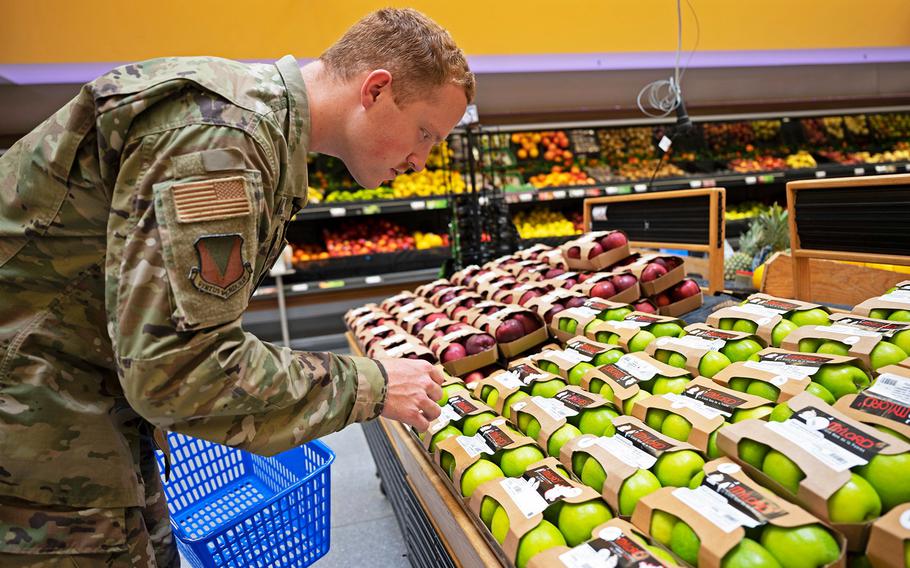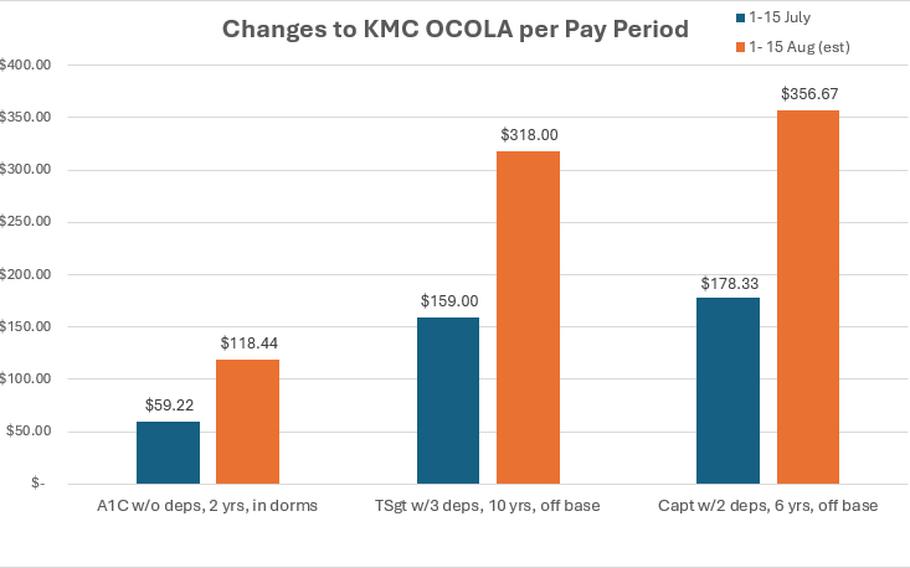
An American airman selects produce while grocery shopping at Ramstein Air Base, Germany, May 17, 2022. On-base offers are not always cheaper, leading many service members to shop in the local economy. The overseas cost-of-living allowance for the Kaiserslautern Military Community is about to rise. (Thomas Karol/U.S. Air Force)
KAISERSLAUTERN, Germany — Service members in the largest overseas U.S. military community are about to have their finances buoyed by an increase in the overseas cost-of-living allowance.
Starting with the end-of-the-month pay period on Aug. 15, the allowance for personnel in the Kaiserslautern Military Community will jump 8 index points, according to data provided by U.S. Army Europe and Africa.
A service member’s allowance is determined by a COLA index, which compares the cost of living for service members stationed overseas with those based in the U.S. The value of an index point depends on rank, years of service and number of dependents.
For example, with the upcoming increase, an E-6 in the KMC with 10 years of service who lives off base and has a spouse and two children will effectively double his OCOLA from $159 to $318 per pay period, assuming current exchange rates, the 86th Airlift Wing said in a statement Monday.

U.S. service members in the Kaiserslautern Military Community in Germany will get a higher overseas cost-of-living allowance starting Aug. 15, 2024. The jump comes after a series of OCOLA cuts for two years. (U.S. Air Force)
This adjustment for the KMC, which includes large Air Force and Army populations at Ramstein and U.S. Army Garrison Rheinland-Pfalz installations, comes just in time for the summer travel season.
The nontaxable allowance aims to ensure that military personnel stationed overseas can maintain a standard of living similar to that of their stateside counterparts.
The index for the KMC climbed from 108 to 116, meaning that living in Kaiserslautern was determined to be 16% more expensive than living at an average U.S. base.
The increase is not limited to Kaiserslautern. Spangdahlem Air Base will see a 4-point rise, while soldiers in Wiesbaden and Hohenfels are in line for a 2-point spike.
At two smaller locations, Garmisch and Kalkar, OCOLA rates will drop by 2 and 8 points, respectively, according to data provided by U.S. Army Europe.
The adjustments reflect the varied economic conditions and cost-of-living differences across different regions.
Germany’s Inflation was 2.2% in June, as measured from the same month last year. Prices for goods overall rose by 0.8%, while prices for services as a whole were 3.9% higher than in the same month last year.
Tickets for trains, buses and similar services rose in price by an average of 3.5%, German officials said. Visits to restaurants can cost up to 6.8% more than the previous year, while vehicle repairs increased an average of 6.2%.
This trend is significant for military families, which often rely on a range of local services.
Food prices increased by 1.1%, with notable rises in the cost of items such as cooking oil, sugar, bread and other pantry essentials.
Maliha Davis, whose husband is a U.S. Army sergeant with 12 years of service assigned to the 10th Army Air and Missile Defense Command near Kaiserslautern, said OCOLA directly affects her family’s budget.
“We have three children, with two being under 2 years old,” Davis said. “So we use OCOLA for groceries and snacks mostly. It still doesn’t cover everything, and we have decreased eating a lot of meat, for instance, to make sure that it covers food.”
The increase in OCOLA will bring much-needed relief for Davis, who said she does most of her shopping off base.
Overseas cost-of-living allowances are regularly adjusted and are based in part on survey data.
Periodic living pattern surveys measure where service members shop, including the proportion of shopping done at military installations, at local community outlets and online. The next living pattern survey for Germany will be in September.
Retail price surveys calculate the cost of non-housing goods and services in the locations where members shop.
Since 2023, OCOLA reductions have been limited to one every six months, effective May 15 and Nov. 15, to make income drops more predictable for service members, as dictated by Defense Department policy.
Rate increases, on the other hand, are rolled out continuously throughout the year, according to officials.
The increase coming in August resulted directly from the November 2023’s retail price schedule, said Lt. Col. Josh Mann, the head of the 86th Comptroller Squadron at Ramstein Air Base.
The Kaiserslautern Military Community’s impending jump in OCOLA rates will be a welcome change for service members, as it reverses a period of reductions that started in June 2022.